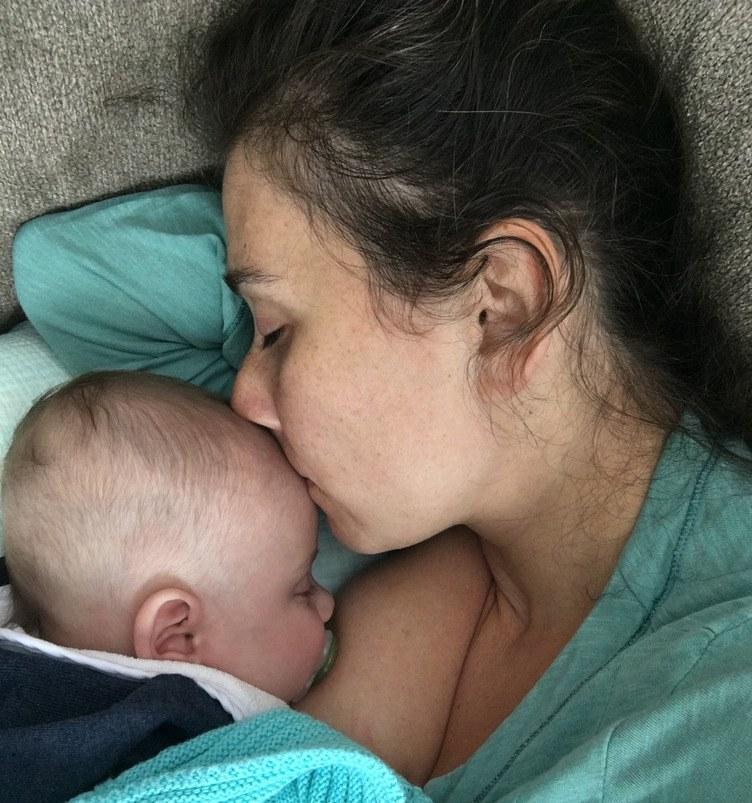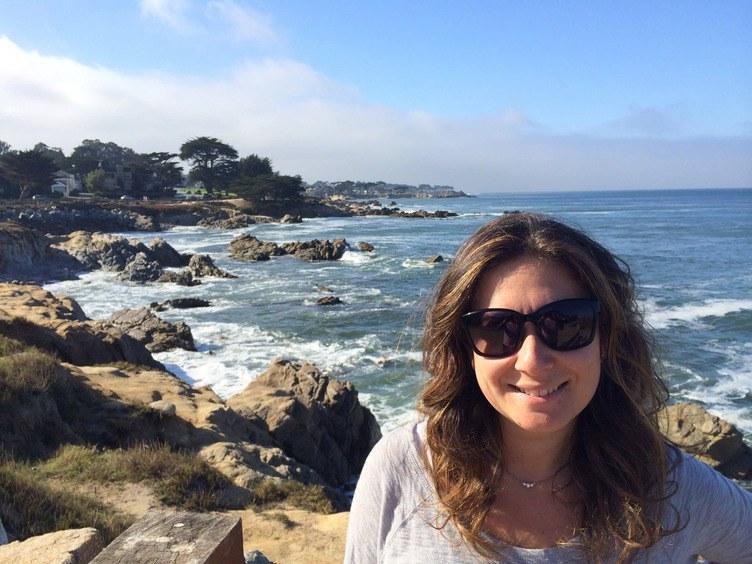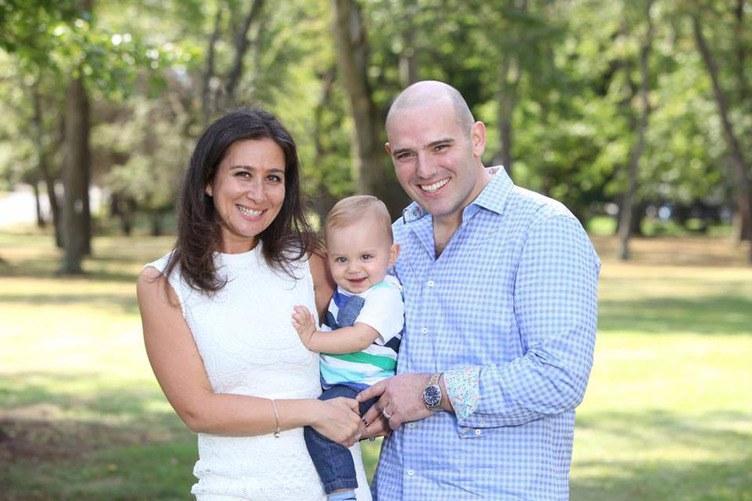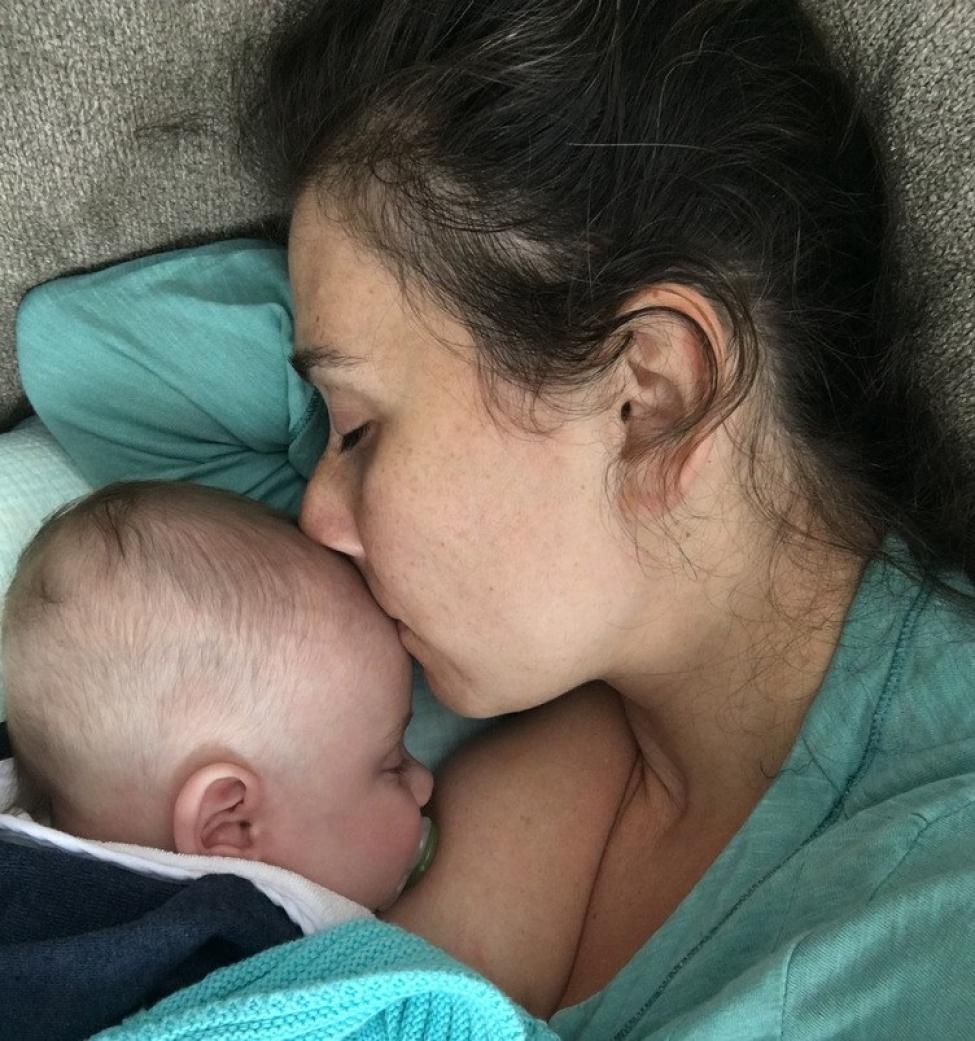Now, I'm on a mission to get my old hair back.
 Courtesy of Zlata Faerman The writer and her son, Shane
Courtesy of Zlata Faerman The writer and her son, Shane
When I was growing up, my hair was so thick that I’d bust through several packs of hair ties a week because they’d always break by the second loop. In my early teenage years, a lot of my friends were dyeing their hair with semi-permanent color and Sun-In, but I prided myself on keeping my hair’s virginity. Ah, those were the days.
Cut to 2017: I have no shame in admitting that I would probably sell my soul to the devil to be able to a break a hair brush with my hair like I used to. I’m in my mid-30’s now and it is nothing like it once was. Hell, my hair doesn’t even resemble itself from five years ago, never mind my teenage years! I can blame weather, age, coloring it (I finally did)—I'm sure they all played a role. But the thing, or rather person, I blame the most is my son.
During my pregnancy, I had the best hair of my life.
About eight weeks into being pregnant with my son, Shane, each strand of hair on my head basically sent me a handwritten thank you note. You know when you feel so good about yourself, you just sort of find life in that? That’s how my hair felt about itself. Every morning it woke up with pep and spent the day with that IDGAF attitude. My hair was shiny and full of bounce like a 1964 Chevy Impala in a Snoop Dogg and Dr Dre rap video. It wasn’t begging for a shampoo every day, and most importantly, it was staying on my head.
Normally, your hair goes through a three-stage process: a growth cycle, followed by a resting phase, and then a shedding cycle. When you’re harboring a human, hormones like estrogen tell hair to grow, grow, grow. “Hormonal shifts during pregnancy help the hairs remain in their active growing phase, so they don't fall out as much as they do otherwise,” dermatologist Joshua Zeichner, M.D., tells SELF. “Some women feel that the hair is never thicker than it is during pregnancy, while others may not appreciate much of a difference.”
“You’re basically keeping your resting hair and growing new hair from the previous resting phase,” Danielle Marzella, hair loss expert and owner of Transitions Hair Solutions, tells SELF. “This leaves the hair feeling thicker, shinier, and healthier overall. I always hear women saying their hair was best during their pregnancies.”
 Courtesy of Zlata Faerman The writer before getting pregnant with her son, Shane
Courtesy of Zlata Faerman The writer before getting pregnant with her son, Shane
But after all the hair-boosting pregnancy hormones went away, so did my thick, full, shiny mane.
I was always used to some shedding—my now-husband’s biggest complaint about sharing a bathroom with me when we first moved in together was the amount of hair that was on the floor. But what happened to me about four months postpartum was no joke. I would lose what seemed like 1,000 strands a day. I was scared to shampoo my hair, and I cried each time because I’d be covered in loose strands. Covered. I’d even find hair in my butt crack.
I could thank estrogen again for this one. Postpartum, when hormone levels return back to normal, your hair rapidly shifts back to its normal cycle, and right into its shedding stage. “What almost all women experience is a rapid hair shedding around three months or so after delivery of the baby,” Zeichner says. “This is known as telegenic effluvium.” While it can be dramatic for women, it’s typically not permanent and hair returns to its regular grow/shed cycle.
Dramatic is putting it lightly. I know it's completely normal and happens to so many women after having a baby, but knowing that doesn't make it any less upsetting. As a new mom, you’re already getting used to (trying to get used to) all of the changes with your body and your life in general. You’ve second-guessed every single decision you’ve made since day one. Your nipples have been on fire since day three. At day 187, you’re still not sure your vagina works properly. You eat differently, you sleep differently, you’re nursing, pumping, constantly thinking of another human being, and the last thing you need is to be shedding like a Golden Retriever.
My son is almost one and a half now, and my hair is still nothing like what it used to be.
I’d say “devastated” is a pretty accurate description for how I feel about my hair now. (I feel the same way about my Facebook Newsfeed, but that’s a whole other article.) In the past few months, I also started getting many more gray hairs and sprouting these thick spirally ones riiiiight where my part is, so you can’t miss them. It took me an embarrassingly long time to get to a salon for a cut and a color, because I was in denial and didn’t want to deal with how horrible my hair made me feel.
I loop a hair tie three times for a ponytail, when I used to do just two. When my hair is blown out, it’s still lifeless and looks as if I flat-ironed it. I have bangs that are 2 inches long, and if I pull my hair up, a huge chunk of it can’t make it that high. (These are new hairs growing in, right?!) All this, and when I went to the salon recently with a photo of the low-maintenance balayage highlights I wanted, I ended up with something very different. So now I’m sad about my hair and I have a shitty color job.
 Courtesy of Zlata Faerman The writer with her son and husband
Courtesy of Zlata Faerman The writer with her son and husband
While (im)patiently waiting for my hair to grow back, I decided to look into what might help give my hair a little boost in the meantime.
Just like my boobs, I expect my hair will never be the same again. (I’ve honestly kind of considered having another child for the boost of estrogen...)
Dermatologist Jeffrey Rapaport, M.D., P.A., made me feel a little better by telling me that there’s nothing a pregnant woman can do to prevent postpartum hair loss. “It should also be noted that your hair will probably restore itself naturally,” he says. Score! “However, if severe hair loss continues beyond a year postpartum, you should see a hair loss expert to determine the etiology.” (That means root cause. And yes, that was a pun.)
Since it's been about that long for me, this is definitely going to be my next step. In the meantime, I got some pretty good advice about what to do to create the best possible chance that my hair will grow back thicker on its own.
“Products that help thicken the hair that is left can help improve the overall appearance of your hair,” Zeichner says. Personally, I’m a fan of the Living Proof Timeless line. Its fortifying complex is geared toward aging hair and benefits postpartum hair by boosting thickness. The collection includes pre-shampoo, shampoo, conditioner, and plumping mousse, which happens to be my favorite.
Zeichner also suggests treatments that promote a healthy scalp to give the new hair growing in some TLC. “Topical treatments or even oral supplements that help promote a healthy scalp provide building blocks needed for healthy hair production and enhance circulation to the scalp for delivery of nutrients to the follicles,” he says. He recommends Nutrafol or Viviscal to encourage healthy growth. Just make sure, if you’re breastfeeding, to check with your doctor before taking any new medication or supplement.
I’m still waiting for my hair to get back to its old self. Maybe it never will, but it doesn’t mean I’m going to stop trying all the volumizing products out there in hopes that one day, I’ll be back to breaking brushes.
SHARE THIS ARTICLE:









